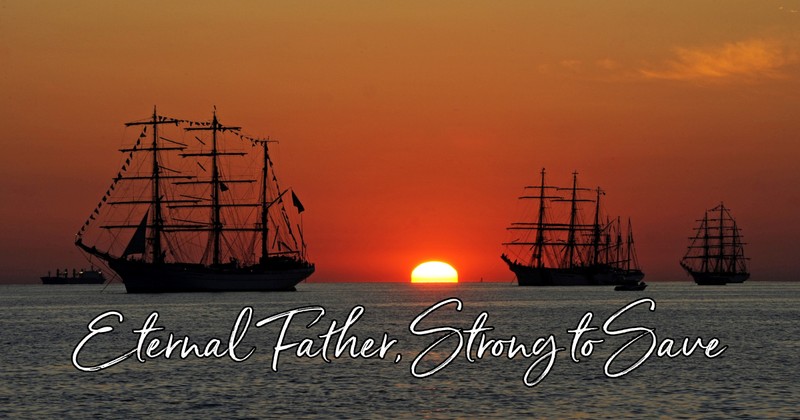
“Eternal Father, Strong to Save“
(Click Above For Performance)
“Eternal Father, Strong to Save” is a hymn written by William Whiting in 1860 inspired by the dangers of the sea described in Psalm 107. This hymn is commonly associated with seafarers, particularly in the naval armed services, and is often referred to as the “Navy Hymn.” This hymn also has a long tradition in civilian maritime settings and is regularly called upon by ship’s chaplains and sung during services on ocean travels.
“The original hymn was penned in 1860 by William Whiting, an Anglican churchman from Winchester, United Kingdom. Whiting grew up near the shores of England, and at the age of thirty-five had felt his life saved by God when a fierce storm nearly destroyed the ship he was traveling on, instilling a faith in God’s control over the rage and calm of the sea. As headmaster of the Winchester College Choristers’ School some years later, he was approached by a student about to travel to the United States, who expressed to Whiting a tremendous fear of the ocean voyage. Whiting shared his experiences of the ocean and wrote the hymn to “anchor his faith”. Whiting is commonly believed to have been inspired by Psalm 107, which describes the power and danger of the seas in great detail:
“Some went out on the sea in ships; they were merchants on the mighty waters. They saw the works of the Lord, his wonderful deeds in the deep. For he spoke and stirred up a tempest that lifted high the waves. They mounted up to the heavens and went down to the depths; in their peril their courage melted away.”
Psalm 107: 23–26
“This hymn was popularized by the Royal Navy and the United States Navy in the late 19th century, and alterations of it were soon adopted by many branches of the armed services in the United Kingdom and the United States. Services who have adopted the hymn include the Royal Marines, Royal Air Force, the British Army, the United States Coast Guard, and the United States Marine Corps, as well as many navies of the British Commonwealth. Correspondingly, it is known by many titles, periodically referred to as the Hymn of Her Majesty’s Armed Forces, the Royal Navy Hymn, the United States Navy Hymn (or just The Navy Hymn), and sometimes by the last line of its first verse, “For Those in Peril on the Sea“.
“In December 2018, the hymn was played at memorial and funeral services for President George H. W. Bush.”
From <https://www.godtube.com/popular-hymns/eternal-father-strong-to-save/>
1″Eternal Father, strong to save,
Whose arm does bind the restless wave,
Who bids the mighty ocean deep
Its own appointed limits keep;
O hear us when we cry to Thee
For those in peril on the sea.
2 O Savior, whose almighty word
The winds and waves submissive heard,
Who walked upon the foaming deep,
And calm amid the rage did sleep;
O hear us when we cry to Thee
For those in peril on the sea.
3 O Holy Spirit, who did brood
Upon the waters dark and rude,
And bid their angry tumult cease,
And give for wild confusion peace;
O hear us when we cry to Thee
For those in peril on the sea.
4 O Trinity of love and pow’r,
Your children shield in danger’s hour;
From rock and tempest, fire, and foe,
Protect them where-so-e’er they go;
Thus, evermore shall rise to Thee
Glad hymns of praise from land and sea.”
